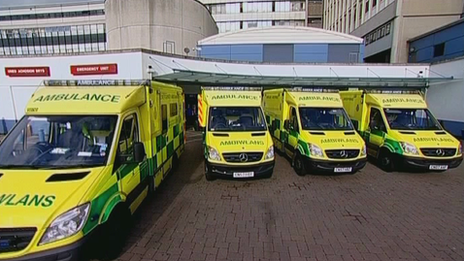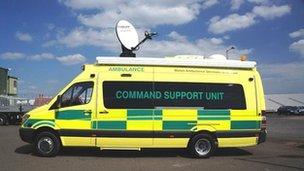Ambulance delays: Wales' national target missed for 16 months
- Published

The ambulance service last hit its eight-minute response target in May 2012
The Welsh Ambulance Service has missed its response time target for the most urgent cases for the 16th consecutive month despite an improved performance.
Figures for September show 62.9% of ambulances arrived on time, up 1.1% on August, but short of the 65% target.
The last time the eight-minute target for Category A calls was met was May 2012.
The ambulance service said September had been a busy month but there were now signs of "continuous improvement".
On response times, areas of north Wales performed better than some areas in south Wales, according to the latest figures.
Ambulances in the Betsi Cadwaladr health board area hit the Category A national target 65.4% of the time, with Wrexham having the highest figure in Wales at 73.4%.

The new command vehicles aim to allow emergency teams to be controlled at the scene
Two other health board areas, Abertawe Bro Morgannwg, covering Swansea, Neath Port Talbot and Bridgend, and Hywel Dda health board, covering Pembrokeshire, Carmarthenshire and Ceredigion, also saw ambulances hit or exceed the all-Wales target figure.
The worst figures for ambulances responses were in the Aneurin Bevan health board area covering the south Wales valleys.
On average, just 58.2% of ambulance arrived within eight minutes. In the Torfaen area, the figure was 49.0%.
Darren Millar AM, Conservative Shadow Minister for Health, said: "Yet again, Carwyn Jones' Labour government has failed to meet key ambulance response time targets, meaning too many patients waited too long for lifesaving treatment last month.
"Having failed to meet targets for this key indicator of patient care for 16 months running, the first minister is now cynically attempting to axe targets to cover up his failing government's woeful management of our NHS."
Major incidents
Welsh Liberal Democrats leader Kirsty Williams said: "It is bad enough that people in Wales have to put up with a government that is less ambitious than those in England and Scotland, but for those unambitious targets to not be met just compounds that misery.
"Labour MP Ann Clwyd is right when she says Wales is behind England in every instance.
"The first minister and his health minister need to stop burying their heads in the sand and start delivering the health service the people of Wales deserve."
A Welsh Ambulance Service spokesperson said: "September was a busy month for us, with the service taking 33,677 emergency calls, with more than a third of these - 13,200 calls - being of the most serious in nature.
"We have introduced a number of measures to improve our responsiveness and it is encouraging to see that we are now showing signs of continuous improvement."
The spokesperson said they wanted to reassure the public that the trust is firmly committed to delivering improvement through its modernisation programme.
"We ask the public only to dial 999 for life-threatening and serious illnesses and injuries - let's keep emergency ambulances for emergencies," the spokesperson added.
A Welsh government spokesperson added: "We are encouraged to note a greater proportion of patients who require emergency care are receiving timely access to ambulance services, particularly as this represents the best performance in 12 months.
"We expect Local Health Boards to continue to work closely with the ambulance service towards achievement of the national target and in delivering equitable ambulance services across Wales."
Meanwhile, the ambulance services said it had bought two vehicles for use in major incidents such as large-scale flooding, chemical alerts and major road or rail crashes.
Each vehicle holds up to five ambulance and medical controllers to work at the scene independently of control rooms using satellite communications technology.
The vehicles were deployed in September with one based around the M4 and the other near the A55 in north Wales.
- Published30 July 2013
- Published9 July 2013
- Published17 June 2013
- Published29 May 2013
- Published24 April 2013
- Published15 April 2013